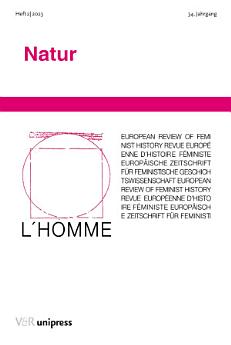Natur
Caroline Arni · Anna Becker · Claudia Opitz-Belakhal
2023 оны 10-р сар · V&R Unipress
Электрон ном
174
Хуудас
family_home
Боломжит
info
reportҮнэлгээ болон шүүмжийг баталгаажуулаагүй Нэмэлт мэдээлэл авах
Энэ электрон номын тухай
Für die Kritik der modernen Geschlechterordnung war und ist die Kritik an Naturbezügen zentral – zugespitzt im Argument, das vermeintlich Natürliche sei ganz und gar kulturell und die Geschlechterordnung (ja, die Geschlechtlichkeit selbst) infolgedessen vollständig sozial konstruiert. Aus dieser Perspektive steht jedes Argumentieren mit Natur grundsätzlich unter Essentialismusverdacht. In der historischen Arbeit entpuppt sich diese Kritik zunehmend als vorschnelle Begrenzung – wenn nämlich nicht auch danach gefragt werden kann, worum es Akteur*innen eigentlich geht, wenn sie von "Natur" reden, oder wenn ein Naturbegriff absolut gesetzt wird, der selbst historisch ist. Im vorliegenden Heft werden solche Fragen anhand historischer Fallstudien von der Antike bis ins frühe 20. Jahrhundert diskutiert. Aus dem Inhalt: Die Rolle der Inkas in Guaman Pomas Geschichte der Anden / Carolyn Merchants "Death of Nature" und sozio-ökologische Utopien der Frühen Neuzeit / Tierische Beziehungen / Schweizer Naturforscher in Niederländisch-Ostindien / German-Speaking Merchants on Honour and Manhood / Vormoderne Geschlechtsidentitäten in Frage stellen? / Die Verkörperung der Natur und der natürliche Körper in Pliniusʼ "Naturalis historia" / Menschen sind auch Mütter / The Nature of the Posthuman: Rosi Braidotti and the Resurrection of Ecofeminismian language? "Nature" and its presumed opposite, "culture" are central categories when examining the modern order of the sexes. A central argument has long been that what is supposedly "natural" might actually be entirely "cultural" and that the "natural" gender order and even gender itself is, indeed, socially constructed. Any reference to "nature" has thus been fundamentally subjected to a suspicion of essentialism, leading to to harsh feminist critiques of intellectual currents such as "ecofeminism" or "feminism of difference". This binary way of thinking, however, seems to bear in it an unproductive limitation of research. It becomes impossible to ask what historical actors are doing when they use the term "nature" and it makes the concept of nature absolute, rather than showing it to be the subject to considerable historical change. This issue discusses questions of the contingency of nature and its relationship with gender along various historical settings, thus making an important contribution to our current debate on "nature", culture and the gendered order of society.
Зохиогчийн тухай
Caroline Arni ist Professorin für Allgemeine Geschichte des 19. und 20. Jahrhunderts an der Universität Basel.
Энэ электрон номыг үнэлэх
Санал бодлоо хэлнэ үү.
Унших мэдээлэл
Ухаалаг утас болон таблет
Андройд болон iPad/iPhone-д Google Ном Унших аппыг суулгана уу. Үүнийг таны бүртгэлд автоматаар синк хийх бөгөөд та хүссэн газраасаа онлайн эсвэл офлайнаар унших боломжтой.
Зөөврийн болон ердийн компьютер
Та компьютерийн веб хөтчөөр Google Play-с авсан аудио номыг сонсох боломжтой.
eReaders болон бусад төхөөрөмжүүд
Kobo Цахим ном уншигч гэх мэт e-ink төхөөрөмжүүд дээр уншихын тулд та файлыг татаад төхөөрөмж рүүгээ дамжуулах шаардлагатай болно. Файлуудаа дэмжигддэг Цахим ном уншигч руу шилжүүлэхийн тулд Тусламжийн төвийн дэлгэрэнгүй зааварчилгааг дагана уу.







